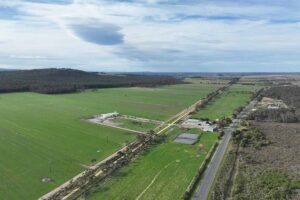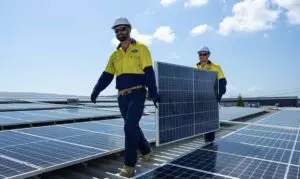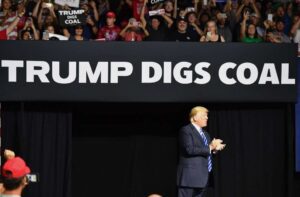The Morrison government has hailed the health of Australia’s carbon market – yes, the country does actually have one – but has decided to delay critical reforms to what is officially known as the Safeguard Mechanism.
Australia’s carbon market was set up by the Abbott government and called the Safeguard Mechanism because the Coalition could hardly call it a carbon market so soon after pulling down Australia’s official carbon pricing mechanism.
The Safeguard Mechanism ostensibly imposes an emissions cap on major industrial emitters. If the industrial emitters exceed their caps, they can be required to offset the increased emissions by acquiring emissions units. But its integrity has been questioned because its weak rules allow polluters to sidestep these safeguards.
Despite this, and following a review of the Safeguard Mechanism, the Coalition government announced that it would further weaken the rules and would allow industrial emitters to apply to have their emissions caps to be increased in line with increases to their annual production.
The introduction of these new rules requires the government to set a range of benchmarks that allow the Clean Energy Regulator to determine how much emissions caps could be increased based on a specific increase in production or output.
While the new approach to setting emissions caps under the safeguard mechanism simplifies the process for industry participants, it has generally been seen as an easy way for big emitters to have their caps increased and weakens the environmental integrity of the mechanism.
The introduction of these new rules have now been delayed, with energy and emissions reduction minister Angus Taylor quietly issuing a new set of regulatory amendments that push back their start date by 12 months to 1 July 2021.
It is yet another, in a growing list of energy market and climate policy reforms, that has been placed on the back burner by the Morrison government, citing Covid-19 as an excuse. In effect, the delay just provides industrial emitters more time to adjust to new rules, reducing their regulatory burden.
Two crucial reforms to the National Electricity Market rules, the introduction of five-minute settlement and the wholesale demand response mechanism, are both likely to be delayed by at least 12 months.
Both reforms are designed to aid the entry of new clean energy projects, including fast-response battery storage technologies and mechanisms for reducing electricity demand at peak times, but have faced opposition from some of the large incumbent energy companies.
Meanwhile, the Clean Energy Regulator says it has found there is no need to intervene in Australia’s carbon markets, despite a crash in demand for permits as Covid-19 restrictions cause a dramatic fall in the aviation and events sectors.
Following a request from Taylor, the Clean Energy Regulator made an assessment of how Covid-19 had impacted Australia’s fledgling carbon markets, determining that there was no need to intervene at this stage to help stimulate demand.
Due to restrictions introduced in response to the Covid-19 outbreak, there has been a significant fall in both aviation travel, and the hosting of major public events, which are both key sources of demand for carbon offsets.
Since the beginning of the year, there has been a slight fall in the spot price for Australian Carbon Credit Units (ACCUs), which have dropped from a recent high of around $17.50 per tonne to below $16 per tonne in May.
This fall is small in comparison to Covid-19 impacts observed in other international carbon markets, including the European emissions trading scheme which saw carbon prices fall from around $25 to around $15 per tonne between February and March but have since recovered slightly.
After receiving a request from federal emissions reduction minister Angus Taylor to review the current status of Australia’s carbon markets, the Clean Energy Regulator confirmed that it would conduct the next auction under the Emissions Reduction Fund in September, but decided there was no need to intervene in the market before then.
“The Clean Energy Regulator has carefully considered whether there is a need for additional support before the next auction in September and is inclined to the view there is not a compelling case to intervene at this time,” the Clean Energy Regulator said in a statement.
“While international carbon markets have experienced falls in pricing in response to COVID-19, the Australian market operates very differently because the Government is the dominant purchaser.”
The commitment to holding the next Emissions Reduction Fund auction in September, where the federal government will consider offers to acquire carbon abatement, but stressed it was important for the government to work towards strengthening Australia’s carbon markets in the wake of Covid-19.
“We will work with the Regulator and the Government to enable the purchase of credits before the September auction to offset impacts from the COVID-19 crisis, with reduced demand from aviation, event and other sectors.”
“Australia’s carbon market fundamentals remain strong as the Minister says, with continued long-term activity and planning from the corporate sector,” Carbon Markets Institute CEO John Connor said in a statement.
“However, recent spot purchase prices have unusually dropped below the recent auction price on soft short-term voluntary demand and lower than expected safeguard mechanism compliance requirements.”
“Australia’s carbon market has invested millions of dollars, particularly into regional Australia. Support and strengthening of the market should be a key part of Australia’s response to COVID, bushfire and climate crises.”
Federal energy and emissions reduction minister Angus Taylor said the Clean Energy Regulator will continue to monitor developments in Australia’s carbon markets, and could later decide to intervene, by purchasing carbon abatement at the price set at the last Emissions Reduction Fund auction, $16.14 per tonne, if a collapse in demand does eventuate.
“I have asked the Clean Energy Regulator to continue to monitor developments in the carbon market closely and take action to support the carbon market further if the need arises,” Taylor said.
“As a result, the Regulator stands ready to purchase Australian Carbon Credit Units at the last auction price ($16.14 per tonne) if the market were to fall substantially.”
“It is important the Government continues to provide support to Australian businesses to reduce emissions – supporting jobs, many in regional areas, and cash flow during challenging economic times.”
The amount of emissions abatement purchased by the Morrison government at the Emissions Reduction Auction has collapsed considerably since they were first introduced in 2015. The last three auctions have secured contracts for just over a combined 5 million tonnes of abatement, when the first three auctions purchased well over 45 million tonnes of emissions reductions each.
One of the main reasons for this dramatic fall has been a reluctance from the federal government to offer higher prices for emissions reduction, not wanting to offer much more than $16 per tonne.
RenewEconomy and its sister sites One Step Off The Grid and The Driven will continue to publish throughout the Covid-19 crisis, posting good news about technology and project development, and holding government, regulators and business to account. But as the conference market evaporates, and some advertisers pull in their budgets, readers can help by making a voluntary donation here to help ensure we can continue to offer the service free of charge and to as wide an audience as possible. Thank you for your support.








